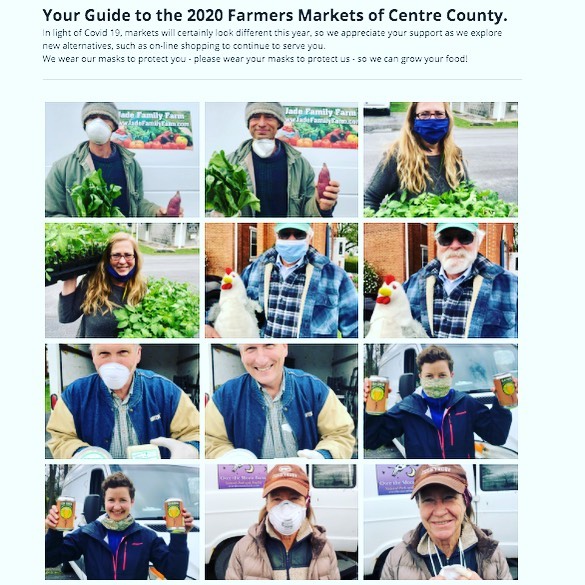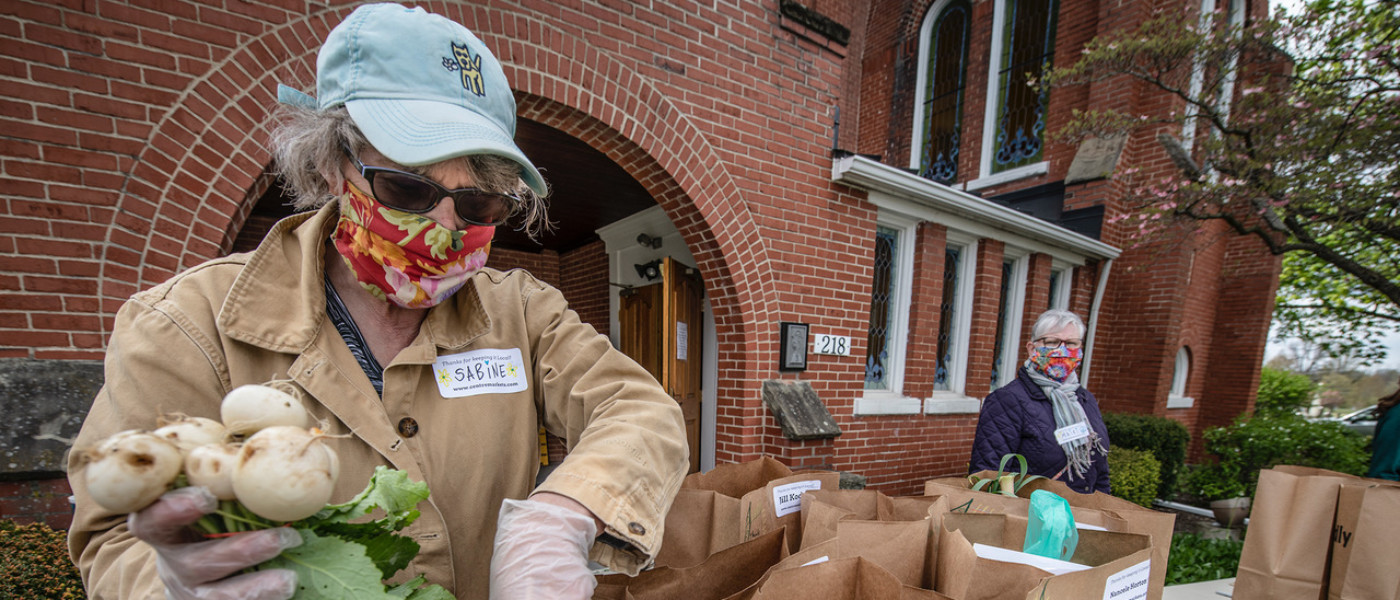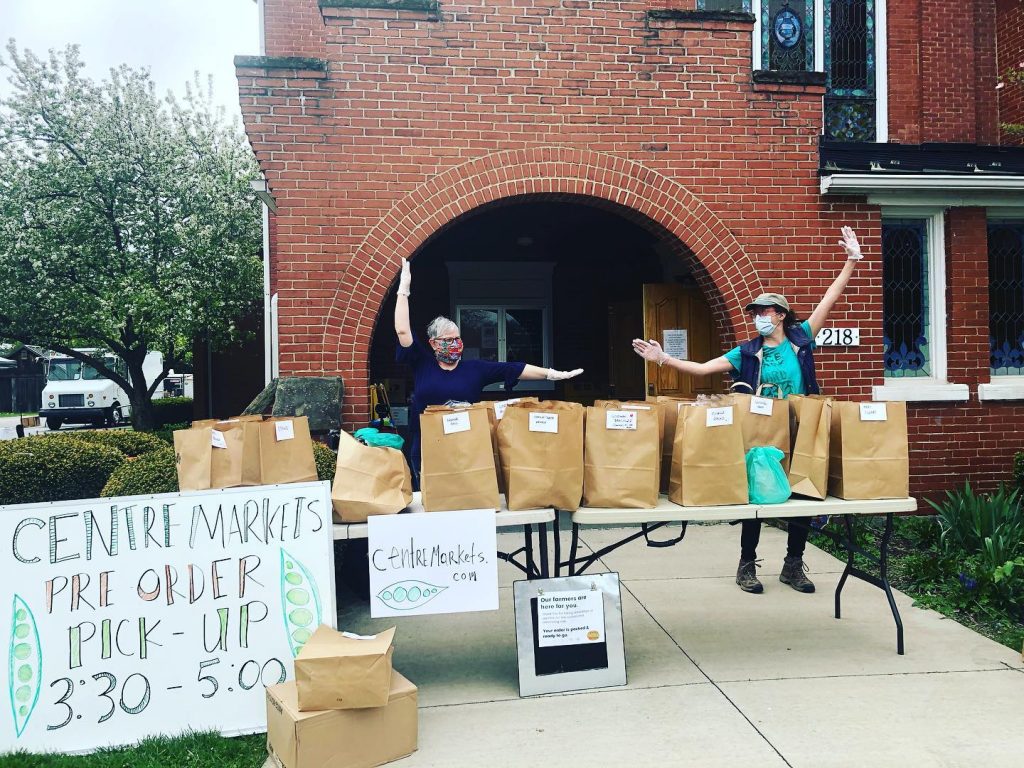Meet Sabine Carey, a long-time Farm Aid friend (she’s been photographing each Farm Aid festival since 2012!), and an organic flower farmer and organic certifier. And, most recently, Sabine is the farmer hero behind a new online farmers market in Centre County, Pennsylvania, called CentreMarkets.
When COVID-19 struck her farming community, Sabine leapt into action (like many farmers across the country) to ensure farmers could safely feed their local community. We asked Sabine a few questions about her experience.
Actions like these are inspiring us right now! We’ll be sharing more stories from innovative farmers and local food systems activists to show you the ingenuity, creativity, resilience and determination of these farm and food heroes during the coronavirus pandemic.
Farm Aid: What were the impacts of COVID-19 on your farm/farm community that pushed you to act?
Sabine Carey: I’m a long-time flower farmer selling at a weekly farmers market, and I’m also on the managing board for one of our local markets. When shelter-in-place restrictions were announced, I really didn’t know what our markets would look like once the busy outdoor season started, or if we’d even be allowed to open them. One of my first concerns was the potential health risks of interacting with and exchanging money with large numbers of shoppers throughout a farmers market day. Many of our vendors are older and in high-risk categories, and I was worried of the potential risks of them selling at market all season long.
For our smaller winter markets in operation in March, vendors were starting to collect pre-orders to minimize personal contacts, but it was a very disjointed system. Every vendor was using a different system: phone calls, email, text, websites etc. It would have taken so much effort for any shopper to order from all their favorite vendors, and they would still have to deal with safely managing payment to each and picking up product at market. My goal was to streamline the process not only for our shoppers, but also for our vendors, and make it safe and convenient to get our food to them.
Farm Aid: What did you do — what were your first steps? How long did it take to get your new effort/model up and running?
Sabine Carey: I had already set up CentreMarkets to organize a collaborative marketing and promotion effort for our local farmers markets with a small grant from our local visitor bureau last year. I had a basic website, mailing list, and social media presence, as well as strong working relationships within the farmers market community in place. It took an intensive weekend comparing online shopping platforms and calling tech support folks to decide on a robust and user-friendly system. Once I decided what systems to go with, one of our smaller local markets asked if we would trial our system with them, and I had them on board and collecting orders two quick days later.
Our online market opened on March 26 with four vendors. Six weeks later, I’m up to 19 vendors, have hired bookkeeping help and volunteers are lined up! We’ve changed locations to allow spacious indoor packing space inside a church, and we’re adding a second pick-up location. Deliveries are the next step to figure out!
Farm Aid: What were the biggest challenges you had to figure out?
Sabine Carey: My first stumbling block was just setting up a legal and financial structure to handle the collection and distribution of income to the farmers, as CentreMarkets existed in name only without a legal structure or bank account. The next challenge has been the aggregation of orders, which takes time, and accuracy. The first week I packed orders in the back of my car, and now we are using a church meeting room and filling up to 8 tables with products and bags and three people working to pack bags. It’s also adding additional logistics to it to keep our social distancing from each other throughout the process! Keeping products such as raw milk and yogurt at appropriate temperatures is something I still need to figure out before we can start deliveries.
The hard part about the challenges is that under normal circumstances, we would have a time frame of months to plan these things, whereas now we need to come up with answers to complicated issues in a matter of hours or days.

Farmers from the Centre County market with and without their masks!
Farm Aid: What has been the reaction to your new farm business innovation?
Sabine Carey: There has been tremendous interest and support from our shoppers and our farmers and producers. Especially shoppers with extra health concerns, and farmers that do not have the technical ability to set up their own systems are especially appreciative of our efforts.
Farm Aid: As a farmer, what is one thing you want eaters to know right now? What is one thing you’ve learned about farming/food/your community or your self during this time?
Sabine Carey: It’s been encouraging to see our community embracing the ability to connect to local food. Of course, we’ve had CSAs and local farmers markets all along, but now there are a whole new additional set of people finding us and reaching out to us.
What we need is long-term, strategic restructuring of our local food system, and fundamental change to our food supply chain. Our local farmers can grow and raise a lot of food, but collecting it in one place, keeping it cool/frozen and getting it out to kitchens in our community is a step that we are struggling with right now.
Eaters need to know that they can – and must – search out, actively support and even possibly help create those new localized systems.
Learn more about CentreMarkets by visiting their website.
How Farm Aid is Responding to the COVID-19 Pandemic
- Investing in farmer-led solutions to respond to the COVID-19 pandemic
- Deploying emergency grants to family farmers and ranchers in need
- Coordinating our national network of experts to create comprehensive resources for farmers
- Offering support to farmers under stress through the 1-800-FARM-AID hotline and connecting farmers to the legal, financial and mental health support resources they need to recover
- Supporting local, state and national farm organizations working on-the-ground to help farmers navigate this crisis
- Advocating for needed COVID recovery funds and resources from the federal government for short-term relief and long-term resilience





